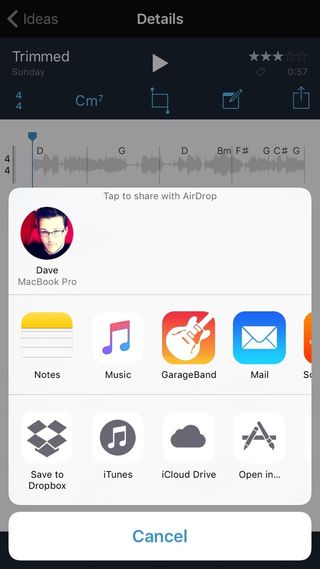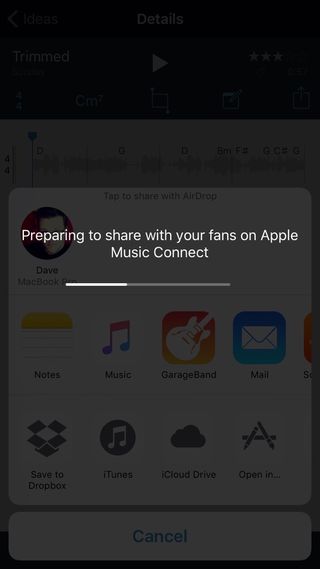Music Memos is a songwriter's best friend

For as long as I've had my iPhone, I've used Apple's built-in Voice Memos app to record my song ideas, collecting iterations of a riff or melody I don't want to forget. But Voice Memos is clunky, has no built-in organizational system, and the editing tools are borderline nonexistent.
For me, the songwriting process usually goes something like this: I sit down with an acoustic guitar and play around until I stumble upon something I like. Then I play it on a loop, letting myself get comfortable enough to twist it around and see how it works with other notes and different voicing. Once I can hear a song in the noise, I'll start singing gibberish lyrics until I come up with a vocal melody that works.
Then I record it, over and over, in Voice Memos.
That's kind of a problem; I see "New Recording 233" and I sigh. Sure, I could have given the clip a real name, but why bother? I have hundreds upon hundreds of clips, with no way to search or filter them. I occasionally go spelunking in the Voice Memos table view list to discover long-forgotten ideas that I really wish I'd taken the time to flesh out. My entire musical idea system is a ghetto.
Enter Music Memos

Conversely, Music Memos offers so many ways of organizing my clips that I'm finding myself recording more just because I can. As I progress through a song I can tag the recordings with the song's name, ensuring that a search for "Elevators" will return all of the clips I recorded for that song. Each recording also gets a name and a star rating, so I can keep everything, refer to earlier recordings if needed, and no longer rely on date-based grouping to keep it all together, or wonder which if the ten clips in the group was the one I liked most.
If Voice Memos are Post-Its — a quick and dirty tool to make sure I didn't forget an idea — then Music Memos is a sketchbook. This is where I start the songwriting process, and every part of the app is designed to help facilitate the process and, most shockingly of all, guide me to the next step in fleshing the song out.
This level of organization also makes me want to start recording practice sessions and charting progress. Having that much raw material available and easily searchable also means more clips we can share on Connect, more early listens we can share with our Patreon supporters, and more options for comparison and background content for our podcast. That's a whole lot of upside for one feature.
Master your iPhone in minutes
iMore offers spot-on advice and guidance from our team of experts, with decades of Apple device experience to lean on. Learn more with iMore!
Music Memos has so many tricks up its sleeves that I feel like someone at Apple read my dream journal.
Music Memos has so many other tricks up its sleeves that I almost feel like someone at Apple has been reading my dream journal. An app for recording song ideas that uses a robust tagging system is something I've personally wanted to build for a long time, but throw in a guitar tuner, chord and tempo detection, exporting to GarageBand, and magical automatic backing instruments, and the dream becomes borderline pornographic.
My experience with the chord detection feature has been mixed, with me watching the app struggle to average out the chords I play with the notes I'm singing. I had the idea to try using it for something else: I've been writing a new song, starting with just a vocal melody. Because I'm a self-taught musician with only an intuitive understanding of music theory, this gets a little tricky. Rather that spending time working out what the chords should be, I decided to just sing the melody into Music Memos and see what it suggested.

This is obviously a bit of a mess, but that's perfectly okay for my purposes. Playing exactly the chords of the vocal melody would be really boring (and on guitar, hard to pull of), but this gives me a great view of the chord set I should be working from. From here, I can start singing over one or two of these chords and work my way out from there. Music Memos has taken one of the most annoying parts of songwriting and made it fun for me. I really can't overstate how great that feels.
The other major songwriting tool in Music Memos is backing tracks. Record your song the way you normally would, and the app will put drums and/or bass behind it. As with everything else in this app, the controls are dead simple: turn drums on by tapping the drums icon, bass by tapping the bass icon.
On the first few tries, Music Memos was comically bad at figuring out where the drum beats should go. I thought that maybe my strum pattern or songwriting style defied rhythm detection, but a few tweaks with the time editor to set the correct downbeat, and things were more or less okay.
I gave it a second chance with a different song — something new I made up with a more obvious tempo placement — and the results were surprisingly good. A couple of adjustments later and I had a beat and a bass line that I liked. Several hours passed with me recording new ideas riffing on what was supposed to be a test song.
That's not to say it sounded great, but it did sound good enough to keep (and even increase) my momentum. Even just testing the app for this article has generated a new song. I'm hard-pressed to think of a better endorsement for a songwriting app.
Automagic
My other favorite feature is a subtle one: "Auto". With this option turned on (again, via a dead-simple button in the main UI), Music Notes does exactly what you'd expect: it sits and listens, and starts recording automatically when it detects that you're playing a song.
The magic behind this feature is pretty easy to guess: the app listens passively, Siri-style, recording everything, and simply saves the recording starting at the beginning of the waveform. But it's these little details that add up for me. Since many (if not most) of my clips and recordings are full of dead air at the beginning while I pull up a lyric sheet or get my capo set properly, this is a big win for me. Sure, I could edit by hand, but I don't, and I never will.
The joy of recording a quick demo is almost overshadowed by how easy it is to escalate.
Taking a step back: while I love the organizational options, the guitar tuner, automatic recording, and the ability to chart my chords right inside the recording, the joy of recording a quick demo is almost overshadowed by how easy it is to escalate.
You can send the song to a friend via email, like before, but you can also send it to GarageBand. Not exactly my cup of tea, but GarageBand files can be opened in Logic Pro X, and at this point things are starting to get really interesting. My quick recordings can blossom into something entirely new and dramatically more sophisticated.



New Post comes up empty. Apparently Connect got distracted and forgot what it was doing.
Or, if I just want to show off a snippet of something I'm playing around with, I can send it off to Apple Music Connect, SoundCloud, or YouTube. I couldn't get Connect sharing to work in my testing — unsurprising if you've ever tried to get Apple Music Connect to do anything — but given Connect's place in the iTunes ecosystem, the day is definitely coming where an artist could write, record, produce, and distribute an entire album using nothing more than their telephone.
Music Memos is less a tool than a toolbox. Each tool works remarkably well for a 1.0 release, and most of them feel like they were designed with my exact needs in mind. The designers could have approached this like recording software, with a series of menus and sub-menus of options, and that would have been more or less fine. But instead Music Memos has the weight and simplicity of spirit of a guitar effect pedal. One button and a handful of dials. Beautiful. My iPhone is only further solidified as an indispensable part of my composing process.
Microphone technology may not be making the same quantum leaps as digital cameras, but putting them to better use is a good start. After all, the best recording studio is the one you have with you.
Dave Wiskus is the lead singer and guitarist for Airplane Mode, an indie rock band from New York City. You can find them on iTunes, Spotify, and Twitter
Most Popular




